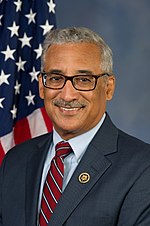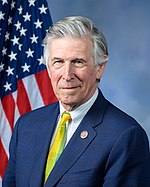Political party in Virginia
The Democratic Party of Virginia (DPVA/VA Dems) is the Virginia affiliate of the Democratic Party based in Richmond, Virginia.[2]
Historically, the Democratic Party has dominated Virginia politics. Since the 1851 Virginia gubernatorial election, the first gubernatorial election in Virginia in which the governor was elected by direct popular vote, 34 Virginia Governors have been Democrats. Since the 1851 Virginia lieutenant gubernatorial election, the first lieutenant gubernatorial election in Virginia in which the lieutenant governor was elected by direct popular vote, 29 Virginia Lieutenant Governors have been Democrats. Since the 1851 Virginia Attorney General election, the first Attorney General election in Virginia in which the Attorney General was elected by direct popular vote, 25 Attorneys General have been Democrats.
As of 2023, Democrats hold a 21–19 majority in the Virginia Senate, and a 51–49 majority in the Virginia House of Delegates. At the federal level, Virginia has voted for every Democratic presidential candidate since 2008. Democrats hold six of the Commonwealth's 11 U.S. House seats and both of the Commonwealth's U.S. Senate seats.
Organization
Staff
- Executive Director: Shyam Raman
- Deputy Executive Director and Chief Technology Officer: Brenner Tobe
- Data Director: Katie O'Grady
- Political Director: Jack Foley
Steering Committee
The Steering Committee makes decisions about the Party in-between meetings of the Central Committee, and also has an exclusive role of overseeing staff.
- Chairwoman: Susan Swecker
- 1st Vice Chair for Organization: Gaylene Kanoyton
- 2nd Vice Chair for Rules and Resolutions: Marc Broklawsk
- Vice Chair for Technology and Communications: Ricardo Alfaro
- Vice Chair for Outreach: Sen. L. Louise Lucas
- Vice Chair for Finance: Clarence Tong
- Secretary: Isaac Sarver
- Treasurer: Abbi Easter
- DNC Member: Del. Joshua Cole
- DNC Member: Doris Crouse-Mays
- DNC Member: Elizabeth Guzman
- DNC Member: Dave Leichtman
- DNC Member: Atima Omara
- DNC Member: Mayor Levar Stoney
- 1st Congressional District Democratic Committee Chair: Dianne Carter de Mayo
- 2nd Congressional District Democratic Committee Chair: Sandra Brandt
- 3rd Congressional District Democratic Committee Chair: Charles Stanton
- 4th Congressional District Democratic Committee Chair: Alexsis Rodgers
- 5th Congressional District Democratic Committee Chair: Patricia Harper Tunley
- 6th Congressional District Democratic Committee Chair: Kym Crump
- 7th Congressional District Democratic Committee Chair: Matt Rowe
- 8th Congressional District Democratic Committee Chair: Margo Horner
- 9th Congressional District Democratic Committee Chair: Rebecca Daly
- 10th Congressional District Democratic Committee Chair: Zach Pruckowski
- 11th Congressional District Democratic Committee Chair: Manisha Singh
- Labor Caucus Chair: Julie Hunter
- Associations of Local Chairs Chair: Tina Winkler
- Democratic Black Caucus Chair: EJ Scott
- Women's Caucus Chair: Linda Brooks
- LGBT Democrats of Virginia Chair: Joel McDonald
- Veterans and Military Families Caucus Chair: Charley Conrad
- Virginia Young Democrats President: Matt Royer
- DisAbility Caucus Chair: Cyliene Montgomery
- Democratic Asian Americans of Virginia Chair: Shyamali Hauth
- Democratic Latino Organization of Virginia President: Alex Cintron
- Rural Caucus Chair: Roberta Thacker-Oliver
- Small Business Caucus Chair: Mark Cannady
- Immediate Past Chair: Dwight Jones[3]
Central Committee
The Central Committee has full control over all matters of the Party, including the adoption of an annual budget, the method of nomination for statewide candidates such as Governor, Lieutenant Governor and Attorney General; the adoption of resolutions and policy statements. In addition, the Central Committee can veto any decision of the Steering Committee.
The Central Committee meets at least four times a year, usually in Richmond, although by tradition, the September meeting is in Fredericksburg. Central Committee meetings are accompanied by meetings of the Steering Committee the night before, and Caucus meetings over the weekend.
The Central Committee is composed of 20 members from each of Virginia's 11 congressional districts. Each district apportions the central committee seats to localities in the district based on population. Additionally, each district committee can elect three more members from local committees and one member of the Virginia General Assembly. The Central Committee is "reorganized" every four years following the election for Governor. The last reorganization was held in March 2022.[4]
In addition, the following people are ex-officio members of the Central Committee and their District Committees:
- Members of the steering committee
- Democratic Virginia members of the United States Congress
- Democratic statewide elected officials, such as Governor, Lieutenant Governor, and Attorney General
- the President Pro Tempore of the Virginia Senate and the Speaker of the House of Delegates, provided they are Democrats
- the Democratic Leaders of the Virginia House and Senate
- the Chairs of the Democratic Caucuses in Virginia the House and Senate
- the president, national committeeman, and national committeewoman of the Virginia Young Democrats
- the president and first vice president of the Women's Caucus
- the chair of the Association of Democratic Elected Officials
- the chair of the Virginia Young Democrats Teen Caucus
- the chair of the Virginia Young Democrats College Caucus
- and the chair of the Virginia Young Democrats City/County Caucus[5]
Local Democratic Committees
Local Democratic Committees serve to promote the Democratic Party in their specific locality. Some committees may contain several localities. Local committees may endorse candidates for nonpartisan office (such as school board) and assist in campaigning for their candidate.
Current elected officials
Members of Congress
U.S. Senate
Democrats have controlled both of Virginia's seats in the U.S. Senate since 2008:
U.S. House of Representatives
Out of the 11 seats Virginia is apportioned in the U.S. House of Representatives, six are held by Democrats:
Legislative leadership
Controversies
In 2019, all three of Virginia's statewide executive office holders, all Democrats, were embroiled in various controversies. Governor Ralph Northam's medical school yearbook page had featured an individual in blackface and an individual in a Ku Klux Klan hood, Lieutenant Governor Justin Fairfax was accused of having sexually assaulted a professor in 2004, and Attorney General Mark Herring was revealed to have worn blackface at a college party. Most Democrats urged Northam to resign from the governorship, but he refused. Ultimately, none of the three accused resigned.[6]








